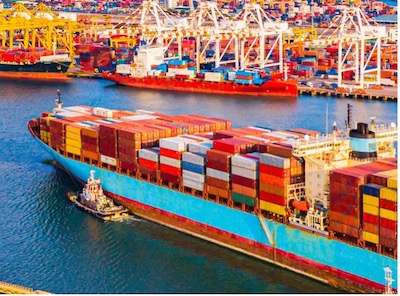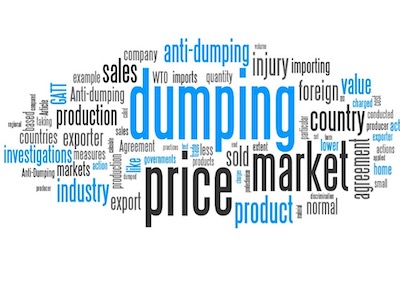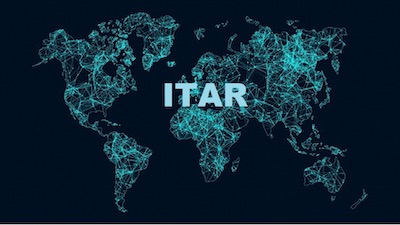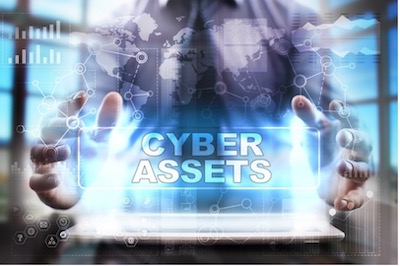
The FDA is Cracking Down on Supplement Manufacturers
Enter any of the more health-oriented grocery stores in the U.S., like Whole Foods, and you’ll see aisles upon aisles of supplements —everything from multivitamins

Enter any of the more health-oriented grocery stores in the U.S., like Whole Foods, and you’ll see aisles upon aisles of supplements —everything from multivitamins

China Tariffs are here to stay – for now. The Biden Administration continues to defend the Trump-era tariffs on goods from China with little guidance as domestic inflation climbs steadily. Meanwhile, 2022 has been a busy year for the Office of the U.S. Trade Representative (“USTR”). The agency was instructed by the Court of International Trade to provide further written justification for the Section 301 Actions for Lists 3 and 4a in the wake of the agency’s obligatory four-year review of each tariff action.

The Maritime Port Authority (MPA in Singapore) is currently in the process of building the Tuas Port, which will be the biggest port in the world with a capacity of 60 million TEU’s (twenty-foot equivalent units) once it is fully completed in 2040. PSA, the company taking the lead in the construction has implemented a four-phase process, with the first phase officially opening this September 2022, with three berths being operational.

In Antidumping (AD) investigations, the U.S. Department of Commerce (DOC) typically selects only a limited number of exporting entities for review, with these exporters referred to as “individual” or “named” respondents. Selection of these respondents is based on U.S. Customs and Border Protection Data, and in most cases due to limited DOC resources, will consist of only a few of the largest exporters.

Joe Compliance has an export control issue involving definition of some of the terms being used. Joe goes to the website of the Directorate of Defense Trade Controls (pmddtc.state.gov) and clicks on “Review the ITAR.” He opens Part 120 where the definitions are found.
According to the science of composition, a semiconductor is a material which, when subject to light, heat or a specific electrical voltage may be transformed into a conductor. Semiconductors are used to produce memory sticks, PC cards, smart cards, microchips, microprocessors, transistors, compact flash, start media, among many other items.

In response to the Executive Order on Ensuring Responsible Development of Digital Assets[1] issued on March 9, 2022, both the White House Office of Science and Technology Policy (OSTP) and the Treasury Department (Treasury) have recently issued reports analyzing the possible design and feasibility of creating a U.S. Central Bank Digital Currency (CBDC).[2] The reports make clear that significant technical issues and major policy considerations need to be addressed for the U.S. to develop a CBDC.

The legality of the Section 301 Actions for List 3 ($200 Billion Trade Action) and 4a ($300 Billion Trade Action) continues to be contentiously disputed before the Court of International Trade. The mass action, In re Section 301 Cases, No. 21-00052, encompasses claims of over 6,500 Plaintiffs that argue the Section 301 Duties, enacted under the Trade Act of 1974, are illegal.

China and Taiwan have been locked in a tussle for decades over who gets to call the island country home. China considers Taiwan a breakaway province, while Taiwan sees itself as a sovereign nation. The recent increase in tensions between China and Taiwan has many experts worried that Chinese forces may soon attempt to retake the mainland by force, but that won’t happen anytime soon. China would face a prolonged conflict on its doorstep that would worsen its already strained economic conditions.

An inherent aspect of any new technology is that it doesn’t take long for bad actors to figure out how it can be weaponized for nefarious purposes. Cyber-related technologies represent an increasingly dangerous area of risk for everyone, whether they are individual citizens, business and infrastructure entities, or governments. Adversaries of the U.S., including China, Russia, and North Korea have engaged in acts of cyberespionage, often intended not only to cause actual harm, but also to test our ability to counter acts of malicious cyber-intrusion.

Enter any of the more health-oriented grocery stores in the U.S., like Whole Foods, and you’ll see aisles upon aisles of supplements —everything from multivitamins

China Tariffs are here to stay – for now. The Biden Administration continues to defend the Trump-era tariffs on goods from China with little guidance as domestic inflation climbs steadily. Meanwhile, 2022 has been a busy year for the Office of the U.S. Trade Representative (“USTR”). The agency was instructed by the Court of International Trade to provide further written justification for the Section 301 Actions for Lists 3 and 4a in the wake of the agency’s obligatory four-year review of each tariff action.

The Maritime Port Authority (MPA in Singapore) is currently in the process of building the Tuas Port, which will be the biggest port in the world with a capacity of 60 million TEU’s (twenty-foot equivalent units) once it is fully completed in 2040. PSA, the company taking the lead in the construction has implemented a four-phase process, with the first phase officially opening this September 2022, with three berths being operational.

In Antidumping (AD) investigations, the U.S. Department of Commerce (DOC) typically selects only a limited number of exporting entities for review, with these exporters referred to as “individual” or “named” respondents. Selection of these respondents is based on U.S. Customs and Border Protection Data, and in most cases due to limited DOC resources, will consist of only a few of the largest exporters.

Joe Compliance has an export control issue involving definition of some of the terms being used. Joe goes to the website of the Directorate of Defense Trade Controls (pmddtc.state.gov) and clicks on “Review the ITAR.” He opens Part 120 where the definitions are found.
According to the science of composition, a semiconductor is a material which, when subject to light, heat or a specific electrical voltage may be transformed into a conductor. Semiconductors are used to produce memory sticks, PC cards, smart cards, microchips, microprocessors, transistors, compact flash, start media, among many other items.

In response to the Executive Order on Ensuring Responsible Development of Digital Assets[1] issued on March 9, 2022, both the White House Office of Science and Technology Policy (OSTP) and the Treasury Department (Treasury) have recently issued reports analyzing the possible design and feasibility of creating a U.S. Central Bank Digital Currency (CBDC).[2] The reports make clear that significant technical issues and major policy considerations need to be addressed for the U.S. to develop a CBDC.

The legality of the Section 301 Actions for List 3 ($200 Billion Trade Action) and 4a ($300 Billion Trade Action) continues to be contentiously disputed before the Court of International Trade. The mass action, In re Section 301 Cases, No. 21-00052, encompasses claims of over 6,500 Plaintiffs that argue the Section 301 Duties, enacted under the Trade Act of 1974, are illegal.

China and Taiwan have been locked in a tussle for decades over who gets to call the island country home. China considers Taiwan a breakaway province, while Taiwan sees itself as a sovereign nation. The recent increase in tensions between China and Taiwan has many experts worried that Chinese forces may soon attempt to retake the mainland by force, but that won’t happen anytime soon. China would face a prolonged conflict on its doorstep that would worsen its already strained economic conditions.

An inherent aspect of any new technology is that it doesn’t take long for bad actors to figure out how it can be weaponized for nefarious purposes. Cyber-related technologies represent an increasingly dangerous area of risk for everyone, whether they are individual citizens, business and infrastructure entities, or governments. Adversaries of the U.S., including China, Russia, and North Korea have engaged in acts of cyberespionage, often intended not only to cause actual harm, but also to test our ability to counter acts of malicious cyber-intrusion.